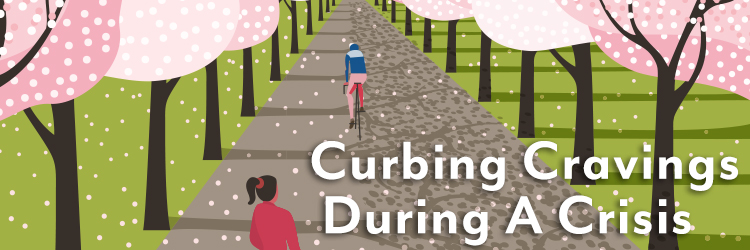[vc_row][vc_column][vc_column_text]The boredom, isolation and stress many are dealing with now may be a recipe for alcohol or drug cravings. Fortunately, cravings don’t mean relapse is inevitable. Below are some techniques that can help curb the urge to drink or use while socially distancing.[/vc_column_text][/vc_column][/vc_row][vc_row][vc_column][vc_custom_heading text=”Come prepared with a list”][/vc_column][/vc_row][vc_row][vc_column][vc_column_text]When you’re in the thick of a craving, it can be hard to talk yourself down. Especially during a crisis like the current pandemic, your nostalgia about numbing out may be overwhelming.
When you’re not having a craving, try to make a list that can help you through. This list could be reasons you’re sober, negative consequences you’ve faced when you drank or used, activities that distract you. Think of it as a note to the version of yourself that’s in fight or flight mode and not as able to make sound decisions.
That said, if you find yourself in a craving and you haven’t made a list, you can still practice these techniques. When drinking or using seems like a good idea, remind yourself of the consequences. Use that time to write a list. This has the dual purpose of changing your thinking and distracting you from the craving.

A trusted person in your life can help ground you in reality. And the reality is that drinking or using would make this time much harder. An added benefit of reaching out is that you will feel connected—which is known as the opposite of addiction—and remember that you are not alone.[/vc_column_text][/vc_column][/vc_row][vc_row][vc_column][vc_custom_heading text=”Distract yourself”][/vc_column][/vc_row][vc_row][vc_column][vc_column_text]Cravings always pass. But it may feel intolerable to wait until they do. If so, figure out activities that take your mind off the craving, whether that’s crocheting, reading, playing video games, exercising, etc. Again, it might help to have a list on hand. That way when a craving hits, you don’t have to spend too much of your already depleted mental energy deciding. But if you don’t have a list, think of activities you can do at home that you know you have a tendency to lose yourself in.[/vc_column_text][/vc_column][/vc_row][vc_row][vc_column][vc_custom_heading text=”Take a walk”][/vc_column][/vc_row][vc_row][vc_column][vc_column_text]A walk gets you fresh air and a new environment. Stepping outside can be like pressing a reset button. And physical activity, even moderate activity, is a healthy way to curb cravings.[/vc_column_text][/vc_column][/vc_row][vc_row][vc_column][vc_custom_heading text=”Sit in the feeling”][/vc_column][/vc_row][vc_row][vc_column][vc_column_text]If you feel capable of doing so, it might be helpful to accept the feeling rather than trying to push it away. For some people, repressing the craving may make it stronger.
Meditation, especially guided meditation, can be useful for this. Meditation is about noticing your thoughts, sitting with them, and then letting them go. Depending on how long you’ve been sober, you may already have experience with this. Learning to feel your feelings instead of escaping them with substances is part of the work of recovery.[/vc_column_text][/vc_column][/vc_row][vc_row][vc_column][vc_column_text]Cravings might happen during this crisis, but you don’t have to be afraid of them. This period of time will remind you that you are strong—and can get through anything sober.
That said, it is never shameful to need or ask for help. If you are struggling with an addiction or a co-occurring mental health disorder, TruHealing Centers is open and here for you. Our facilities are receiving third-party, hospital-grade sanitization, and we are offering telemedicine services, to ensure you can feel safe getting treatment. At each of our recovery centers across the country, we will give you the tools you need—including aftercare plans and relapse prevention—to thrive in long-term recovery. To find out more, call an admissions specialist at 410-593-0005.[/vc_column_text][/vc_column][/vc_row]








